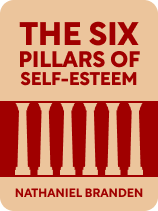

This article is an excerpt from the Shortform book guide to "The Six Pillars of Self-Esteem" by Nathaniel Branden. Shortform has the world's best summaries and analyses of books you should be reading.
Like this article? Sign up for a free trial here .
Do you suffer from low self-esteem? How does having low self-esteem affect your life outcomes?
Just as healthy self-esteem benefits you, poor self-esteem harms you. Having low self-esteem causes you to behave in ways that further erode your self-esteem, diminish your happiness, and create problems in your relationships and work. Many people don’t even realize they have low self-esteem because it can be concealed by a false sense of confidence that may ultimately cause greater harm.
Learn about the negative effects of low self-esteem.
The Effects of Low Self-Esteem
According to self-esteem expert Nathaniel Branden, poor self-esteem encourages fear—and thus obstructs your ability to raise your self-esteem. He contends that to increase your self-esteem, you must believe that you’re capable and worthy of facing reality—about yourself, others, the circumstances of your life, and the consequences of your actions. But if you suspect you’re not capable or worthy, you don’t look for answers because you fear that they might prove you right: In other words, low self-esteem makes you afraid of facing reality. So you instead find comfort in the idea that you behave how you do because it’s who you are. Your behavior aligns with this image—which, as we’ve seen, lowers your self-esteem even further, creating a vicious cycle.
For example, if you have low self-esteem, you might fear that you’re incapable of sending out a strong job application—and then grow so paralyzed by this fear that you never bother to create one. You then create an image of yourself that you’re the kind of person who can’t find a job, and then you continue behavior that prevents you from finding a job—like not filling in the application.
(Shortform note: While people with low self-esteem are afraid of their own perceptions of reality, they tend to trust external validation. One study suggests that people with low self-esteem are more receptive to positive feedback from others than from themselves because they see others as more reliable. So if you’re afraid to fill out a job application, you could ask a friend to do it with you.)
One of the negative effects of low self-esteem is struggling in a romantic relationship. When you don’t love yourself, you’re unable to give love to others. So you instead look for others to give you the approval you can’t give yourself. This isn’t really love, Branden posits, but rather a search for validation. Worse, if you do receive love, you can’t accept it. When reality clashes with your narrative that you’re unlovable, you grow anxious. But you never consider that your narrative is wrong. Instead, you resolve your anxiety by making reality match what you believe and taking self-sabotaging actions that prove you’re unlovable—like being cruel to partners who treat you well until they get fed up with your mistreatment and leave.
(Shortform note: One study suggests a different way people with low self-esteem sabotage their relationship: To avoid being rejected outright when they ask their partners for help, they seek support in indirect ways—like sulking. However, this technique backfires: The partners tend to respond negatively, and the people with low self-esteem end up without the support they wanted.)
Moreover, low self-esteem damages your ability to succeed at work, too. Notably, you may feel threatened by others’ success. Since you’re unconfident in your own abilities, you judge others’ accomplishments not by their own merits but by how they reflect on you: When they succeed, you feel jealous and worry that their achievement will show the world how little you’re accomplishing. This may lead you to engage in destructive behavior, like being unnecessarily rude to your successful colleague.
(Shortform note: To diminish your jealousy over others’ accomplishments, one founder recommends saying to yourself: “Wow, I’m looking forward to reaching that milestone. What can I learn from how they got there? Viewing their accomplishment as an achievable goal will put it in a positive light and motivate you to work on your own ventures, too.)
Finally, some people with low self-esteem develop a false sense of self-esteem, or “pseudo self-esteem”—which, Branden warns, is dangerous. They don’t want to admit that they feel incapable and unworthy, so they find external sources of validation—like friends or lovers or possessions. For example, you may derive your self-worth from the attractiveness of your spouse. But this isn’t true self-esteem, Branden contends. Self-esteem ultimately comes from how you—not others—view yourself. So self-esteem that comes primarily from others lacks the benefits of true self-esteem. Moreover, Branden warns, it risks making you dependent on how others view you—which would lower your self-esteem even more.
(Shortform note: Social media has turned over-reliance on external validation into an epidemic, leading to low self-esteem, depression, and anxiety in many users. As it becomes easier to validate others and receive validation, people crave it in every aspect of their life—and they’ve grown so attached to other people’s reactions that they can’t recognize how they feel about themselves. To break this cycle, use self-reflection to recognize when you’re seeking validation through social media, and consider taking a break or even deleting your social media accounts in order to learn to rely on your own judgment of yourself.)

———End of Preview———
Like what you just read? Read the rest of the world's best book summary and analysis of Nathaniel Branden's "The Six Pillars of Self-Esteem" at Shortform .
Here's what you'll find in our full The Six Pillars of Self-Esteem summary :
- Exactly how to behave to improve your self-esteem
- Why you need to take responsibility for your life and actions
- Why so many self-esteem techniques don't work






